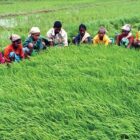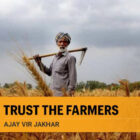Security means being able to fend for oneself. India can only feed everyone if it first ensures soil health in its farms and the financial health of the farmer.
Whether it is the harvesting or sowing season, the joy has gone out of the Indian countryside. The harvest is faced with uncertainties around selling and prices while sowing is a bigger cause for anxiety. The Indian farmer does not know what crop will earn him a fair price. Consider a personal dilemma over the crop to sow after harvesting wheat. Guar seemed to be the preferred option to cotton. The price of cotton has dropped by more than 80 per cent since last year due to the flip-flop in the cotton export policy of the union commerce ministry, amongst other reasons. Guar prices, however, have gone up by over 400 per cent in one year.
Guar has always been an option because it is good for improving soil fertility rather than as a commercial crop. With its price at ₹30,000 per quintal, it gave good reason to research it for its commercial aspects. Surprisingly, 85 per cent of the global guar is grown in India and 80 per cent of what is grown in the country is exported, for valuable foreign exchange. Guar gum finds applications in the areas of oil-drilling, textiles, paper, medicines, cosmetics, mining, explosives, apart from food.
Expecting more farmers to sow guar given the high prices that it is fetching, as a farmer, one explored the opportunity to sell 80 per cent of the projected guar output in the futures market, as a risk-mitigation strategy. As only to be expected The government of India has banned futures trading in guar! Guar is not an essential food commodity but vested interests that lost money on the futures market and international buyers manipulated the system to depress prices. A good thing cannot be kept down for long though and the price of guar which, on the day of the ban on futures trading, was prevailing ₹23,000, is now ₹30,000.
The first article of the Indian Constitution begins with the phrase: “India, that is Bharat,” but, over the years since India became a Republic, the development and progress of the country has been selective to particular regions and communities. As a result, quite literally, India has progressed while Bharat – that resides in the villages – has become another nation. Giving Bharat a voice in policy-making is apparently now a mission. However, even when the Prime Minister formed a sub-committee on ‘Enhancing Agriculture Production and Food Security’, he selected members of the Prime Minister’s Council on Trade & Industry. Farmers are still not consulted and possibly not considered intelligent enough to know what is good for them. It is apparent that the industrialists and, increasingly, those from urban areas, influence policy more than any other section of society.
Non-government organisations in India have received donations from overseas worth nearly $20 billion or ₹1,00,000 crore, from 2000 till date. One is quite certain that most of this largesse has gone into propagating policies that will not allow Indian citizens and India, as a nation, to be self-sufficient. It appears there are conspiracies to contain India’s growth by funding NGOs that oppose constructive policies and propose destructive programmes. Oscar Wilde had said, in a different time and under different circumstances, that: “selfishness is not living as one wishes to live, it is asking others to live as one wishes to live”. It applies perfectly to that half of India that decides how the other half should live. That is the problem one encounters with many individuals and many NGOs that are cynically referred to as “no good organisations” in the country.
The intention behind the enactment of a law to ensure the right to food for all is fabulous but the approach has been diabolical. India needs to invest money, time and effort to become self-sufficient in food, more than anything else. It is absurd that the policy of providing cheap food is destined to make farmers, who are supposed to feed the nation, the recipients of cheap foodgrain. Could the money not be used to make farming a profitable profession? Were that the case, the government would not need to provide jobs or food to people.
India is an extractive economy. ‘Why Nations Fail: The Origins of Power, Prosperity and Poverty’, a book by Daron Acemoglu and James Robinson, points out that India is “saturated by economic institutions that are structured to extract resources from the many by the few and that fail to protect property rights or provide incentives for economic activity. Extractive economies can achieve growth for a while, particularly as today when resources are being transferred from the unproductive agricultural sector into manufacturing but run out of steam eventually. The right policies for growth are not too difficult to determine. The question is why do some regimes deliberately follow a perverse path to economic ruin. The answer: politics. It has been said that poor countries are poor because those who have power make choices that create poverty. They get it wrong not by mistake or ignorance but on purpose”.
There is no single solution to providing food security for all Indians but many small and significant changes and solutions put together, right from research, policy, use of traditional and modern knowledge, optimum input utilisation, transferring knowledge to farmers while accepting and adopting age old knowledge available with the farmers, is what will together help solve the country’s problems. Security means being able to fend for oneself. India can only feed everyone if it first ensures soil health in its farms and the financial health of its farming community. At present it is doing neither.




